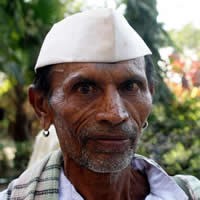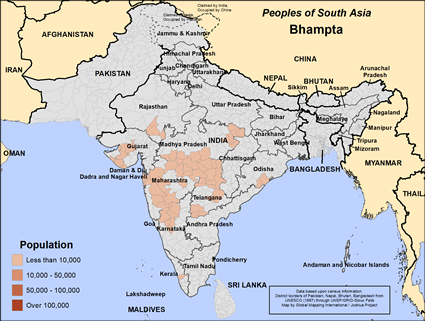Bhampta in India

Photo Source:
Copyrighted © 2026
Isudas All rights reserved. Used with permission |

Map Source:
People Group data: Omid. Map geography: UNESCO / GMI. Map Design: Joshua Project.
|
| People Name: | Bhampta |
| Country: | India |
| 10/40 Window: | Yes |
| Population: | 45,000 |
| World Population: | 45,000 |
| Primary Language: | Marathi |
| Primary Religion: | Hinduism |
| Christian Adherents: | 0.00 % |
| Evangelicals: | 0.00 % |
| Scripture: | Complete Bible |
| Ministry Resources: | Yes |
| Jesus Film: | Yes |
| Audio Recordings: | Yes |
| People Cluster: | South Asia Hindu - other |
| Affinity Bloc: | South Asian Peoples |
| Progress Level: |
|
Introduction / History
Bhamta are also known as Takaris. Members of other castes who have taken to crime are frequently known as Bhamta. The Bhamta have two main divisions, the Chhatri Bhamta, who are usually immigrants from Gujarat, and those of Maharasthra who are often known as Bhamti. Both men and women were traditionally petty thieves and pickpockets. They were well known to the police. Some gave up picking pockets and began to care for livestock to earn a living. The Bhamta were clever in adopting disguises and dressing as members of another caste. They would keep to one disguise for years, and often travelled hundreds of miles stealing from the houses of the people whose dress they adopted, or taking service with a merchant or trader. Once having gained their employer's confidence, they departed with valuable property they had not paid for. The main languages of the Bhamta are Marathi and Hindi. Most Bhamta today live in west and central India. There are currently no known believers in this people group.
What Are Their Lives Like?
Many of the Bhamta caste are now engaged in the cultivation of hemp, from which they make ropes, mats and gunny-bags. Hemp is woven by Bhamta, who also make net bags for holding cotton. They also make ropes of hemp and flax. Tenants who will not grow hemp themselves frequently give their field to a Bhamta who gives them a share of the crop. Bhamta possess knowledge about herbs and medicines. Their expertise can be utilized in the collection and development of herbs and medicinal plants which are in demand in India and elsewhere. Bhamta practice both child and adult marriages. They allow for polygamy. In theory there is no limit to the number of wives a man can have. A member of the caste can marry two sisters and brothers can marry sisters. Cousin marriages are common.
What Are Their Beliefs?
The Bhamta people are entirely Hindu. As Hindus, they worship the gods and goddesses that they believe will provide them with protection and favor. They sacrifice goats and fowls to their patron gods before their weddings.
What Are Their Needs?
The Bhamta people need more markets for their hemp products. Their jaded past will diminish as they earn an honest living and thereby gain the respect of others. Illiteracy is a major issue for the Bhamta. Their children need good local schools. Bhamta villages often lack access to modern medicine and electricity.
Prayer Points
Ask the Lord to help Bhamta parents provide for their children. Pray for a disciple making movement among the Bhamta people this decade. Ask the Lord to send out workers to the Bhamta people to tell them about Jesus Christ and help meet their spiritual and physical needs.